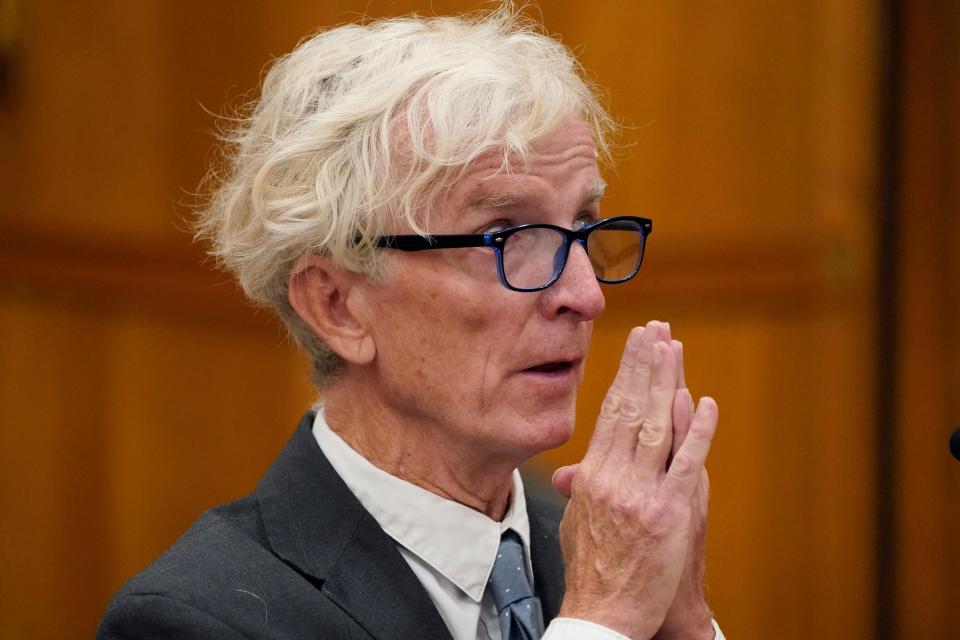Judge denies abortion clinic request to stay open while fighting Mississippi's trigger law
Most abortions are set to become illegal in Mississippi on Thursday, and the state's last operating clinic failed to push that timeline back in court Tuesday.
Hours after a roughly hour-long hearing in the morning, Special Chancery Judge Debbra K. Halford on Tuesday afternoon denied Jackson Women's Health Organization's request for injunctive relief.

The clinic, also known as the Pink House, has been fighting a legal battle to stay open as long as they can, after Attorney General Lynn Fitch set the state's trigger law into motion last week.
Rob McDuff, a longtime attorney for the Pink House, has argued that the state's trigger law should not go into effect due to a 1998 Mississippi Supreme Court ruling known as Pro-Choice Mississippi v. Fordice. McDuff had argued that the clinic should be allowed to continue providing abortions while it attempted to challenge the law itself in court.

Halford denied McDuff's request for a number of reasons.
Halford wrote in her decision that in order for an injunction to be necessary, the plaintiffs — in this case the clinic — must prove four things.
First, that "there exists a substantial likelihood that plaintiff will prevail on the merits."
Second, that "the injunction is necessary to prevent irreparable harm."
Third, that "the threatened harm to the applicant outweighs the harm the injunction might do to the respondents." Lastly, that "entry of the injunction is consistent with the public interests."
Halford ruled that the clinic's argument did not meet all of those conditions. She said the case will ultimately be decided by the state supreme court, not her court, and that she is not convinced it is likely the high court will side with the clinic.
"When considering Fordice, in light of Roe, Casey and Dobbs, it is more than doubtful that the Mississippi Supreme Court will continue to uphold Fordice," Halford wrote.
Likewise, Halford found the third and fourth conditions to not be met.
"The Court finds that Plaintiffs fail to show that the balance of harms weighs in their favor," Halford wrote.
As for the second condition, Halford's ruling was a mixed bag. She wrote that certain people involved, particularly patients who will face "loss of life opportunities," are irreparable. However, she did not consider the harm that would come to clinic owners and doctors to meet that standard.
"We are disappointed with this failure to enforce the Mississippi Constitution. We are reviewing the judge's decision and considering our options," McDuff said in a statement later Tuesday afternoon.
McDuff's argument for striking down the abortion ban is based around the 1998 Mississippi Supreme Court decision in Pro-Choice Mississippi v. Fordice.
"The state constitutional right to privacy includes an implied right to choose whether or not to have an abortion," the court's 1998 decision reads.
However, much of that decision on how to interpret state law relied on U.S. Supreme Court decisions on federal law like Roe v. Wade and Casey v. Planned Parenthood, argued Mississippi Solicitor General Scott G. Stewart.

“There is no Roe or Casey anymore,” Stewart said. “And as a result, there is no Fordice."
Supreme Court Chief Justice Michael Randolph appointed Halford after all four Hinds County chancery judges recused themselves from the case.
If abortion is banned and the Pink House does close, Mississippians could face hundreds of miles of travel in order to obtain a legal abortion.
This article originally appeared on Mississippi Clarion Ledger: Mississippi abortion law: Judge denies clinic request to stay open

